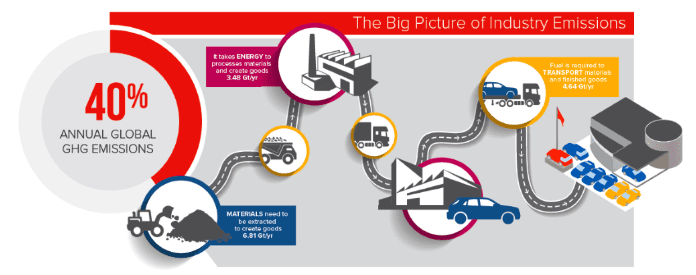
Report | 2019 [updated 2020]
The Next Industrial Revolution
Rocky Mountain Institute’s quest to decarbonize industry
Whether or not we realize it, industrial activities are at the very center of our economy and our lives. They are essential to creating and delivering the things we use every day, from the cars or bicycles we use to get around, to the phones or laptops we use to connect to the world, to the cement, steel, and bricks we use to build houses. These products all require raw materials, along with energy (usually in the form of fossil fuels) to create and transport them.
Consumer goods are brought to us through a set of industrial activities that starts with the sourcing of raw materials, either through recycling or virgin extraction. Those raw materials then undergo energy-intensive processes to refine them. Next, the goods are manufactured, generally in a large, energy-intensive factory, and finally they are shipped to end consumers, typically on ships, planes, or trucks that use fossil fuels.

Although few of the activities in this chain are consumer facing, they play important roles in our everyday lives. Not surprisingly, these activities also contribute a significant share of global greenhouse gas (GHG) emissions each year. If you include the emissions from the generation of electricity (Scope 2 emissions), the industry sectors represent more than 40% of the global GHG footprint today. In addition to their contribution to climate change, these emissions create daily risks to our food and water, our health, our homes, and our economy. Further, by 2050, the GHG emissions of the seven largest industry subsectors will be twice the world’s entire carbon budget if we are to stay on a pathway that will not cause global temperatures to rise more than 1.5°C.
Even if all other sectors—such as personal mobility, buildings, and power generation—are fully decarbonized tomorrow morning, these seven industry subsectors alone will release enough GHGs to drive global warming far in excess of 1.5°C.
Because industry decarbonization is critical to maintaining a 1.5°C pathway, Rocky Mountain Institute’s Industry program is on a mission to decarbonize the world’s goods and services, including how they are designed, produced, sourced, and delivered.
